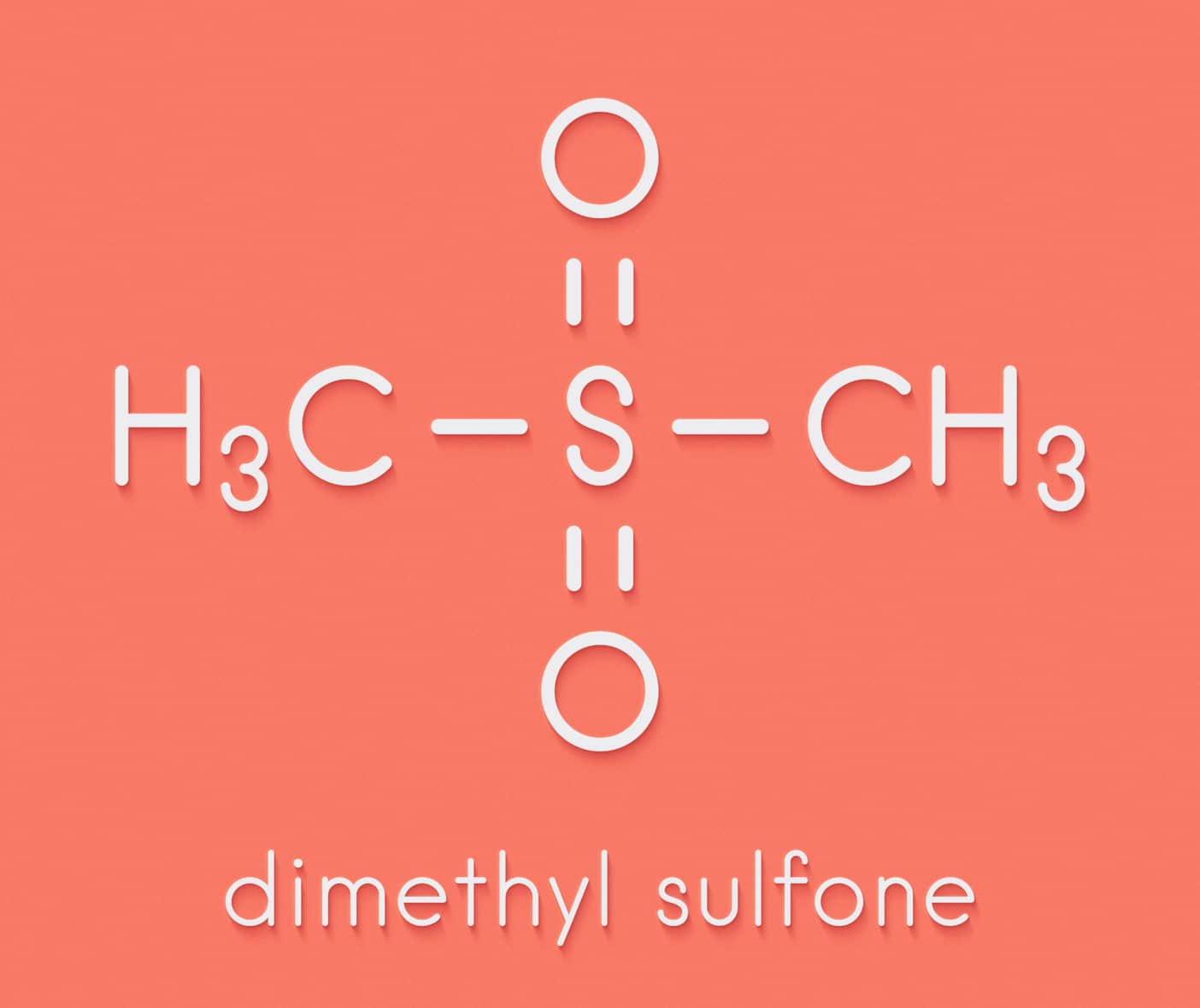Methylsulfonylmethane

When we think of sulphur, we usually immediately think of various unpleasant smells from chemistry lessons. But the fact that sulphur also exists in other forms and is even suitable for beauty care is not so well known. The most interesting example is methylsulfonylmethane (MSM), also called dimethylsulphone. The substance is found in many plant and animal organisms and is the simplest organic sulphur compound within the substance class of sulphones. To a certain extent – namely 0.2 percent – our organism also consists of sulphur. We humans take in the natural, mineral and essential trace element with our food. Green vegetables, herbs, cow’s milk and fruits are particularly rich in MSM, but the total content is so low that a supply in powder, tablet or capsule form is increasingly recommended by experts.
Effect of MSM in the body
For good reason, because methylsulfonylmethane is extremely important for our bones, muscles, enzymes and hormones, among other things. As a component of chondroitin sulphate, the substance also plays an important role in our cartilage tissue. The substance is able to promote the regeneration of our muscles and get our metabolism going. Food intake is improved by a well-filled methylsulfonylmethane depot and the intestinal flora is supported, unpleasant flatulence is reduced. MSM is also said to have anti-inflammatory properties.
However, since methylsulfonylmethane is very sensitive and is destroyed in food by long storage and heating, dietary supplements are a sensible way to optimally replenish the body’s own MSM depot. Even with a very balanced diet, it is not always possible to cover the body’s needs sufficiently.
However, sulphur deficiency can lead to joint pain, listlessness, connective tissue weakness, circulatory disorders and intestinal problems, among other things. But beyond that, methylsulfonylmethane is also a true all-rounder for our skin, hair and nails, because too little sulphur is often associated with grey, sallow skin, brittle hair and brittle fingernails. Therefore, the substance is ideal for sophisticated cosmetics.
How MSM affects skin, hair and nails
Methylsulfonylmethane primarily stimulates keratin and collagen synthesis. These two proteins are essential components of our body and give strength and firmness to our connective tissue, hair and nails. If more MSM is available to the organism, this also stimulates the sulphur metabolism, which increases the elasticity of the skin and promotes hair growth.
Wrinkles also diminish, while the connective tissue becomes firmer in return. This means that MSM can also be used against cellulite. Ultimately, MSM can effectively contribute to firmer skin, fuller hair and healthy, strong nails. At the same time, the substance offers another health benefit, as it acts as a highly effective antioxidant that strengthens the body’s defences and destroys free radicals.
Furthermore, methylsulfonylmethane is used against rosacea and other inflammatory skin diseases. Redness and itching usually subside quickly, and the formation of nodules is reduced. Methylsulfonylmethane is also effective in the treatment of acne. Here, the substance is a frequent component of skin-soothing and cooling gels and ointments.
Another interesting area of application is the treatment of psoriasis. Sulphur is known for its antifungal properties and helps to detach dead skin cells.
In this way, it is an excellent choice for care products for a wide range of skin and hair needs. Combinations with coconut oil, aloe vera, marula oil, jojoba oil and olive oil are considered particularly effective.
However, the quality of the product plays a major role. Separating agents and artificial additives should not be included, if possible, as they could negatively influence the effect of MSM.
Possible applications include hair treatments, hair and face masks, shower gels, body lotions, peelings and also baths for hands, feet and nails.
MSM is not yet officially approved as a medicine, but it is usually offered as a dietary supplement.
By the way, side effects are not known so far, but possible allergic reactions cannot be completely ruled out. The FDA (American Food and Drug Administration) has already officially recognised MSM as safe. An intake of four grams per day is considered absolutely safe from a health point of view. And even an overdose of MSM is virtually impossible, because an adult person would theoretically have to consume more than one kilogram of the substance daily to risk possible symptoms of poisoning.
Fact sheet
INCI: Dimethyl Sulfone
Alternative names: Methylsulfonylmethane, Dimethylsulfone.
Definition: organic sulphur compound, belongs to the substance class of sulphones
CAS number: 67-71-0
EINECS / ELINCS number: 200-665-9
Description: colourless crystals
Taste: slightly bitter
Melting point: 107 to 110 degrees Celsius
Boiling point: 238 degrees Celsius
Natural sources: Milk, coffee, vegetables, herbs, nuts.
Cosmacon develops the optimal skin care routine for you with MSM
Sulphur is a vital mineral that performs many important functions in our body. If a deficiency occurs, the enzymes and proteins only fulfil their tasks insufficiently. Skin, hair and nails also suffer from too little MSM: hair looks brittle and loses elasticity, skin is dry and sallow, nails split and break easily. This is where high-quality cosmetics with MSM come in. The substance contributes to the formation of keratin and amino acids and thus not only beautifies the appearance of the skin, but can also strengthen the nails and hair. Cosmacon will be happy to develop sophisticated formulations with MSM for you.
Literature:
Muizzuddin N, Benjamin R.Int J Vitam Nutr Res. 2022 Jul;92(3-4):182-191